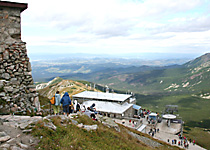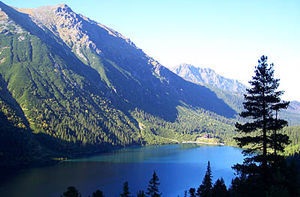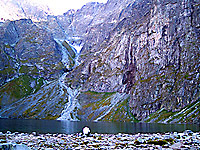Zakopane, the famed mountain resort south of Krakow
Town of Zakopane sits at the foot of the craggy
Tatra Mountains (Tatry), the highest part of the
Carpathian Mountains. Once an obscure hamlet, Zakopane has
become the country’s chief holiday destination in the early
20th century and earned the nickname “the winter capital of
Poland”. Actually, the town is teeming with holidaymakers
all year round even if the greatest crowds come in winter
and between May and mid-October. March, April, and
November are considered the low season but even then the
little, sprawling city attracts tourist crowds, notably on
weekends.
Vacationing in Zakopane, Poland.
Most visitors arrive to
Zakopane for a short break filled with hiking in summer and
skiing in winter. The mountains resort is also a popular
destination of day trips for residents of Krakow and the
region. At the same time, many tourists opt for longer
holidays in Zakopane and the town with its environs
certainly provides recreational attractions galore to keep a
vacationer happy for weeks.
Hikers can take advantage of
trails in the contiguous
Tatra Mountains National Park totaling some 250
kilometers as well as numerous other tracks in the area.
Good conditions for downhill skiing last in the vicinity of
Zakopane from November to early on famed upper mountainside
of Kasprowy Wierch peak and from December through March on
artificial ski slopes closer to the town. Other available
outdoor activities include cycling, climbing, cave
exploration, swimming, tennis, cross-country skiing, and
skating. Yet many tourists come to Zakopane just to enjoy
spectacular scenery, crisp air, and such undemanding
diversion as strolls, cable-car rides, street performances,
sightseeing, varied amusements, etc.

Top station of the cable car atop Kasprowy Wierch (1985
meters above sea level). The bottom station is situated in
Zakopane, namely its Kuznice district.
Zakopane can boast nine
local museums plus a number of art galleries, a theater
company with its own playhouse, and a cinema. The town is
renowned for its vigorous folk traditions, the epitome of
Poland’s gorale highlanders heritage, manifest in local
dialect, in the
wooden architecture, in customs, in traditional
costume – even today proudly worn by the locals – in folk
music, and in handicrafts.
As regards Zakopane’s once
fabled
nightlife, it stays pretty energetic today, with
plenty of nightspots – clubs, bars, discos, restaurants, or
whatever.
Geography of Zakopane
The town of Zakopane spreads
out in a narrow valley called Row Podtatrzanski, between
Gubalowka ridge and the foothills of the Tatry Mountains to
the south.
Noisy and overcrowded
pedestrian mall, Krupowki street, forms the backbone of the
central Zakopane. Apart from the busy center, the town
mostly consists of quiet villages among spruce groves,
linked together by potholed streets, bumpy roads, and steep
lanes.
Zakopane is situated at the
highest altitude of all cities in Poland and its elevation
ranges between 750 meters and 1,100 meters above sea level.
Lodgings. Hotels and hostels in Zakopane.
The town boasts
accommodation for incredible number of 100,000 visitors.
There are nearly twenty hotels in Zakopane, including
cosmopolitan four-star operations and a modernist concrete
monolith which sleeps 500. Most of them provide decent if
undistinguished service. Yet the bulk of available lodgings
in Zakopane consist of assorted hostels and boarding houses,
from backpacker shelters to homely bed-and-breakfasts to
comfy guest houses with a tennis court on the premises.
Trekkers may stay in eight
mountain lodges conveniently situated in the most popular
parts of the Tatry National Park.
Zakopane is situated barely
100 kilometers from
Krakow by road, to the south. Yet driving takes
usually as long as two hours due to traffic congestion,
speed limits, and tailbacks that result from frequent road
works, accidents, and other mishaps. And both motorists and
bus passengers should be prepared for a three-hour journey
or longer on weekends and public holidays.
The main route from Krakow,
popularly known as Zakopianka, leads via Myslenice and Nowy
Targ, and it consists of a dual carriageway (a divided
highway) between Krakow and Lubien and a two-lane highway
for the most of the rest of the distance. The first sixty
kilometers of the itinerary, from Krakow to Rabka/Zabornia,
correspond to the international highway E7 which is Poland’s
main trans-European route linking the Baltic Sea with the
Mediterranean via Slovakia and Austria; then the national
road number 47 meanders from Rabka to Zakopane. At times the
highway climbs steeply enough to slow down heavily laden
lorries and in winter rigs occasionally fail to get through
blocking the road.
There are frequent buses to
Zakopane from
Krakow’s central coach station at 18 Bosacka
street. Also minibuses ferry passengers between Krakow and
Zakopane. Plus up to ten trains a day run to Zakopane from
Krakow Glowny centrally situated main rail station, both
expresses and slow trains that cover the distance in 3 hours
and 30 minutes or so.

Morskie Oko lake is a must-see of
the Tatra National Park.
Weather in Zakopane
The elements are famously
fickle in Zakopane and its climate is noticeably harsher
than the weather
in Krakow. Even sunny summer days tend to be
interrupted by fleeting showers, thunderstorms, and gales.
An average annual temperature hovers around 5 degrees
Celsius. Typically, Julys have the highest average
temperature (15 degrees Celsius) while Januarys are coldest
with average temperatures or about minus 6 degrees Celsius.
Winds usually blow from the
west or the southwest and they aren’t strong. A notable
exception is a faehn wind called halny, warm and arid, which
occurs in autumn, spring, and sometimes winter and may blow
for a couple of days exceeding 100 kilometers per hour.
Annual precipitation
averages 1,000 millimeters. The biggest rainfall usually
takes place in June and July due to frequent rainstorms. As
a rule the first snow falls in November and the last of it
melts away for good in late March or early April.
see weather in Krakow

Czarny Staw (Black Pond), the
austere sister lake
of the nearby gorgeous Morskie Oko
Museums in Zakopane
Muzeum Tatrzanskie im.
Tytusa Chalubinskiego /Tatra Mountains Museum/
at 10 Krupowki street. Phone (+48) 182015205. Web site
www.muzeumtatrzanskie.pl
The museum amassed the best collection of the region’s village
art. It also shows the history and the nature of the Tatry
Mountains as well as traditions of their inhabitants.
Willa Oksza (branch
of Muzeum Tatrzanskie)
at 25 Zamojskiego street. The 20th-century Polish art inspired
by the Tatra Mountains and the local village crafts or
created by artists living in Zakopane.
Muzeum Stylu
Zakopianskiego im. Stanislawa Witkiewicza (Zakopane Style
Museum)
at 18 Koscieliska street. Phone (+48) 182013602. Web site
www.muzeumtatrzanskie.pl
The museum in wooden Villa Koliba shows the output of the
Polish artists inspired by the Zakopane folk traditions in
the late 19th century and the early 20th century.
Karol Szymanowski's
Museum (branch of the
National Museum in Krakow)
at 19 Kasprusie street. Phone (+48) 182013493.
Biographical museum of composer Karol Szymanowski in wooden
Villa Atma where he lived from 1930 to 1936.
Kornel
Makuszynski's Museum
at 15 Tetmajera street. Phone (+48) 182012263. Website
www.muzeumtatrzanskie.pl
Biographical museum of writer Kornel Makuszynski, author of
popular books for children.
Jan Kasprowicz's Museum
at 12a Harenda street. Phone (+48) 182068426.
Biographical museum of Poland’s outstanding poet Jan
Kasprowicz.
Pod Kuzniczym Mlotem
Museum (Zakopane and the Tatras Gallery)
at 6 Place Niepodleglosci square. Phone (+48) 608809469. Web
site www.muzeum.podhale.pl
Output of Zakopane artists.
Muzeum Walki i Meczenstwa
"Palace"
at 7 Chalubinskiego street. Phone (+48) 182017249.
Exhibition devoted to the martyrdom and the resistance under
the Nazi German occupation during WW2.
Muzeum Walk i Meczenstwa
"Wiezienie hitlerowsie"
at 37 Nowotarska street.
A former nazi prison houses another exhibition devoted to the
martyrdom and the resistance under the German occupation
during WW2.
Osrodek
Muzealno-Dydaktyczny Tatrzanskiego Parku Narodowego /Tatra
National Park Museum and Educational Centre/
at 42a Chalubinskiego street. Phone (+48) 182063203.
Exhibits pertaining to the nature and the history of the Tatry
Mountains National Park.
Please note that Zakopane’s
museums are rather cozy and modest establishments.
Tourist information centers in Zakopane
-
Tourist Information at
17 Kosciuszki street. Phone +48 182012211, fax +48
182066051. Email info@promocja.zakopane.pl
-
Tourist Information at 8
Generala Galicy street. Phone +48 182066950, fax +48
182066656. Email office@promocja.zakopane.pl
see tourist information centers in Krakow
|





